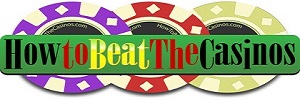How To Find Loose Slot Machines
If you fit into the majority of casino visitors, you’re probably at least an occasional slot machine player. As you’ll know from reading various articles on this blog, I’m not a huge fan of slot machines – not because they’re not fun and entertaining to play, but simply because they fall outside of my “acceptable games to play in a casino if you want to have a chance at taking some money home in the long term”. Generally, I consider any casino game with a house edge of more than 2.5% to be a risk simply not worth taking (in the long term). And slot machines typically take between 4% and 15% dependent on denomination and game type.
That said, if you are going to play slot machines, you’ll want to find “loose” games to play. What’s loose? Simply, a machine that has a high payback percentage – the amount of money you get back for every dollar or pound you put into the slot machine. In general terms, I’d consider a slot machine loose if it paid back 95% or more. Slot machines which pay less than 90% I’d consider “tight”. Slot machines which fall somewhere in the middle band (90% – 95%) are simply “average”.
There’s been a lot of strategies / formulas ideas published over the years (some free, some chargable “systems”) which claim to tell players how to find a loose machine. General tips from these formulas / strategies (most of which I consider to be a total waste of time, and certainly not worthy of any money investment) are:
1) Look for slot machines near the ends of aisles – casinos put “loose” slot machines there so that people will see lots of winners and want to play the slots. REALITY: casinos got wise to this years ago, so don’t expect to find the machines there anymore. They might be in the middle of a slot bank, they might be at the end, they might be near a bar or restaurant, or they may simply not exist at all. All are possible.
2) Look for slot machines that have a “wobble” in the reels when they spin – they’re due for a jackpot. REALITY: The “wobble” proves nothing. It might just be that the slot machine in question needs maintenance – or has a fault developing, or simply that the plastic wheel has worked itself a bit loose. Besides, the vast majority of slots these days are VIDEO SLOTS that don’t have “reels” – so the whole wobble theory is pretty much redundant in any case.
3) Ask the slot attendants. They know which slot machines are due for a jackpot. REALITY: They’ll take your tip money if offered, but they have no better clue than you do about whether a particular machine will pay out today. Why? Machines are RANDOM devices that could pay out 3 jackpots in a row, then none for 3 months – or one a month for 3 months, or one then nothing for 5 years, etc. There is no way to know when a machine will pay out – the Random Number Generator in a slot machine is generating random numbers all the time, and it’s when the number is chosen that signifies a “jackpot” that you’ll get the jackpot. Not before, not after. (Note: UK Readers – UK Fruit Machines (Crazy Fruits, Bar X, Barcrest machines etc) DO work on a cycle of sorts… don’t confuse these with true “slot machines”).
4) Watch the machines, and when the little old lady who’s been playing for 2 hours and exhausted her slots budget finally gets up, go to her machine and play it. You’re going to win! REALITY: See 3) above. Slot machines are random. There’s no guarantee that you’ll get a slot machine jackpot / payout just because somebody lost who was playing it before you. Slot machines are never “due” for a jackpot. The odds of most jackpots are always about 1,000,000 to 1 or more – similar odds to some of the higher payouts on a lottery ticket.
There are many more theories like these, destined to become gambling myths. Let me share with you now my version of REAL observations that I believe CAN help you (they HAVE helped me over the years – and you’ll know that the main reason for writing this blog is to share my knowledge so that you too can Beat the Casinos!):
1) The higher the denomination of the slot machine you’re playing, the higher the likely payout percentage. If you play 5c / 5p machines, expect a payout percentage of about 88% or thereabouts. If you play £1 / $1 machines, expect a payout percentage of 92 – 93%. And so it goes on. This runs true in almost ALL casinos.
Why? Every slot machine takes up floor space in a casino, and each slot machine is expected to make a certain amount of revenue. Casinos will pay higher payback percentages on a higher denomination, because the AVERAGE BET on those machines is higher than on a lower denomination machine. In the long run, most of the machines, despite denomination, will likely produce similar revenue figures for the casino, because of this percentage payback formula.
2) Dumpier casinos tend to have better paying machines. This is not always true, but in general terms you’ll find (for example) better payouts in dumpier Downtown Las Vegas or in Las Vegas North etc rather than on the glitzy Las Vegas Strip. All casinos have overheads / running costs, but the glitzy casinos have more money to recoup from their building costs, more money to make to cover their better trained staff, more money to make to cover their nicer buffets / restaurants. It makes sense that if there’s more profit that needs to be made to cover running costs, that it needs to come from somewhere – and most likely, that will be from slot players. (Note: regardless of where you play, ALWAYS join the Players Club – get points and comps based upon your play, which helps you to get a little of that edge back).
3) Casinos with competition tend to have higher paying machines than those without. Again it’s not guaranteed, but you can expect areas like Las Vegas, Reno, and Atlantic City to pay higher than a US Indian Reservation (Tribal) Casino etc. The more casinos there are in an area, the better it is for players. Casinos know that they want to get a reputation as the “highest payouts” provider in any area, if they’re intending to stay in business, and attract loyal long term players.
4) Online (Internet) casinos tend to have machines that pay very well across the board – sometimes as high as 98%. The lower running costs of an online operation are often passed on to you, the player. Furthermore, considering 3) above, there is nowhere on the planet hotter than the INTERNET for casino competition – there’s THOUSANDS of online casinos available to us all, at the simple click of a mouse.
Importantly, online casinos WANT you to become loyal players. Did you know that Internet casino players typically play MORE OFTEN than those players visiting casino areas? Why? Because the Internet is available 24 hours a day, regardless of where you live/are at the time. But here’s an interesting observation: Internet casino players generally LOSE LESS (per betting session) than real casino visitors – because the games are often “looser” – and because of the impact that “bonus cash” / “free money” / “comps” have online.
Talking of bonus cash, all of the casinos I promote (and have personally played in) offer bonus / matchplay cash for first time players – which can (generally) be used to play slot machines! Give yourself an advantage by playing with the casino’s money as well as your own – there’s a great chance for you to win.
Don’t forget about my January 2008 promotion in which I’m PERSONALLY giving you FREE cash when you join any of these casinos via the blog and meet the signup requirements (see the top of ANY page in this blog for full details). Your joining of the casinos also helps to support this blog and keep it FREE for all. That’s a nice thing to do!
I hope this article helps you to find many loose slot machines, that you can empty! Do let me know what you do with your winnings!


Well, o.k. I find most of the
article to be accurate.
However, after playing in 88
casinos, by my count, over the
past 30+ years, I believe that the
term “random” is totally true and
that there are absolutely rules
concerning slots.
It would seem that you’re going to
have higher hit frequencies on $5
and $1 machines, rather than on
penny and nickel games. It has
been mentioned that the higher the
posted jackpot ($4,000 vs. $1,000)
the lower the chances of hitting
the top payout.
I find that there is no real
correlation (see your comment on
the possibility that the next
jackpot may take 5 years to hit).
I have hit the highest payouts on
penny machines and gotten blasted
on $5 jobs. I personally witnessed
a woman who made 40 consecutive
pulls on a $25 machine and hit
absolutely nothing. I saw one
fella pull on a $500 machine 13
consecutive times and get zilch.
So, the emphasis is, every single
pull means pure and total luck as
to what you’re going to win, if
anything; nothing more, nothing
less.
As you’ve correctly pointed out, there is a lot of luck involved when it comes to slots. That’s why I mentioned that I felt many of the so called “systems” were a waste of cash. 🙂
Good luck to you when you play!